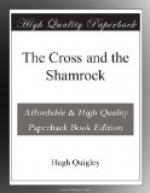“O Gulvert,” said his better half, sobbing again anew, “you will kill me! I cannot live with you, that is the amount of it! How dare you, sir, lend money, or dispose, of my means, without first having consulted me! I lay my death at your door!” she added, in a sharp, angry tone.
“Dear wife, don’t blame me——”
“Away, old man!” she interrupted, “away, and leave me here to despair! I fear I will never again leave this bed; and if I find myself able, I shall never after spend a day in your house, but go back to my native state, and take out a bill of divorce against a man who knows nothing but to spend and squander the means of his family.”
“O ma,” said Libby, “do go away from father, the ugly fool, and I will go with you, won’t I?”
“He ain’t nothing else, sis,” said she, “but a poor ugly fool, a shiftless, good-for-nothing old man. O, me! O, me! I could easily have known that this would be the case, from the dreams I had for two nights.”
“I had a dream too, ma,” said sis, who, though only going in her eighth year, was perfectly well versed in all the arcana of the science of interpretation. “I dreamed I saw you crying, ma,” continued Lib, “and that there was blood on the stairs, and all way up garret, and that Shaw, my father, had spilt the blood all round.”
“That’s just it, sis,” said her mother; “the blood signifies the death of our ‘darling team;’ my crying is on account of them; and Shaw, the fool, your father, was the cause of all this trouble, and that is why he appeared to you to spill the blood. My dream was not so clear as yours, but I could have guessed that something was going to be the matter.”
Poor Gulvert was in great pain, in consequence, among other things, of the oft-repeated threat of his wife to separate from him; and, to give vent to his sorrowful reflections, he went up garret as quietly as he could, and folding himself up in several heavy “comforters,” or padded quilts, he forgot his grief by falling into a sound sleep. Meantime Pete and Bill Kurney, the two Irish converts of Parson Waistcoat, seeing things in confusion, thought that now was the time for them to free themselves forever from the hypocrisy, as well as bad board, of Mr. Culvert; and, to add to the grief of Mrs. Gulvert, next morning they were not to be had. These knowing fellows, hearing of Gulvert’s character, put themselves in his way, and being questioned as to the nature of their doctrines, and finding them suitable to his taste, he hired them, and brought them home to work on his farm. They not only became “converts” during the first week in his house, but went to meeting regularly, where they were complimented on their highmindedness and independence in shaking off Popery, and got frequent chances to tell their experience. Besides their hypocrisy, these were thorough scoundrels; for they not only robbed their employer of the two hundred dollars which he had advanced them to bring out their




